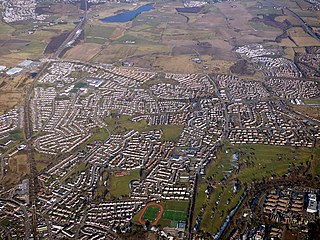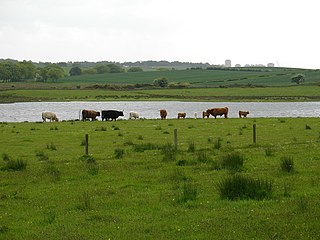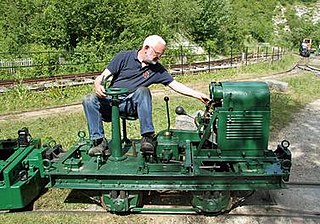Related Research Articles

East Dunbartonshire is one of the 32 council areas of Scotland. It borders the north-west of Glasgow and contains many of the affluent areas to the north of the city, including Bearsden, Milngavie, Balmore and Torrance, as well as many of the city's commuter towns and villages. East Dunbartonshire also shares borders with North Lanarkshire, Stirling and West Dunbartonshire. The council area covers parts of the historic counties of Dunbartonshire, Lanarkshire and Stirlingshire.

Bishopbriggs ; Scottish Gaelic: Drochaid an Easbaig) is a town in East Dunbartonshire, Scotland. It lies on the northern fringe of Greater Glasgow, approximately 4 miles (6 km) from the city centre. Historically in Lanarkshire, the area was once part of the historic parish of Cadder - originally lands granted by King William the Lion to the Bishop of Glasgow, Jocelin, in 1180. It was later part of the county of Lanarkshire, and then an independent burgh from 1964 to 1975. Today, Bishopbriggs' close geographic proximity to Glasgow now effectively makes it a suburb and commuter town of the city. The town's original Gaelic name Coille Dobhair reflects the name of the old parish of Cadder, but modern Gaelic usage uses Drochaid an Easbaig, a literal translation of Bishopbriggs. It was ranked the 2nd most desirable postcode in Scotland to live in following a study by the Centre for Economic and Business Research in 2015 and 2016.

Kirkintilloch is a town and former barony burgh in East Dunbartonshire, Scotland. It lies on the Forth and Clyde Canal and on the south side of Strathkelvin, about 8 miles (13 km) northeast of central Glasgow. Historically part of Dunbartonshire, the town is the administrative home of East Dunbartonshire council area, its population in 2009 was estimated at 19,700 and its population in 2011 was 19,689.

HMP Low Moss is located on the outskirts of Bishopbriggs, East Dunbartonshire; near Glasgow, Scotland. It has been operated by the Scottish Prison Service as a prison since 1968 and was for low-category prisoners who had sentences of less than 36 months to serve. The original establishment was closed in May 2007, with the entire site being cleared and redeveloped with a considerably enlarged footprint. The new prison was reopened in March 2012, and accepted its first intake in almost five years. Karen Smith is the Governor of the establishment.

Lenzie is an affluent town by the Edinburgh and Glasgow Railway in the East Dunbartonshire council area of Scotland. It is about 6 miles (10 km) north-east of Glasgow city centre and 1 mile (2 km) south of Kirkintilloch. At the 2011 census, it had a population of 8,873. The ancient barony of Lenzie was held by William de Comyn, Baron of Lenzie and Lord of Cumbernauld in the 12th century.
Andrew Roger Henderson is a Scottish rugby union footballer who played at centre; who was capped 53 times and scored eight tries for Scotland.
Peckham's was the trading name for a chain of specialist grocery stores. Peckham's advertised itself as a vintners, victuallers and delicatessen company, and also offered luxury hampers & gifts online.

Auchinloch is a village in Scotland, situated within the North Lanarkshire local authority area but very close to the boundary with East Dunbartonshire and sharing the G66 postcode of the town of Kirkintilloch and the adjoining village of Lenzie, located a short distance to the north. Other nearby settlements in North Lanarkshire are Stepps to the south and Chryston to the south-east, each approximately 1.3 miles (2.1 km) away across farmland and on the opposite side of the M80 motorway; the City of Glasgow boundary and the suburb of Robroyston is about the same distance to the west. In previous years Auchinloch was in the Parish of Cadder and, from 1975 until 1996, the district of Strathkelvin within Strathclyde Region.

Lenzie Academy is a co-educational comprehensive secondary school located in Lenzie, East Dunbartonshire, Scotland. The catchment area covers Lenzie, Auchinloch and southern parts of Kirkintilloch.

Stewart MacDonald is a Scottish Labour Party local government councillor. He was elected to the East Kirkintilloch and Twechar Ward of East Dunbartonshire Council in the 2007 election. Stewart MacDonald is also a member of Kirkintilloch Community Council and the Bridgeton Burns Club.

Chryston High School is a six-year non-denominational secondary school situated in Chryston, North Lanarkshire Scotland.

Pearl and the Puppets was a band from Kirkintilloch, East Dunbartonshire in Scotland. The band comprised singer-songwriter Katie Sutherland (vocals/guitar), Blair McMillan (drums), Gordon Turner (guitar), Scott Clark (bass) and Michael Abubakar (keyboard).

Nicola Ann Raphael was a Scottish schoolgirl who died from suicide after enduring years of bullying because she dressed in a goth style. Her death on 24 June 2001 and allegations of bullying at her school, Lenzie Academy, led to coverage in the local and national press.

The Gadloch is a fresh water loch in North Lanarkshire, situated near the town of Lenzie, Scotland.

The Auld Aisle Cemetery is located in Kirkintilloch, East Dunbartonshire, Scotland. The cemetery is protected as a category A listed building, and includes graves dating back to the eighteenth century.

Kirkintilloch Town Hall is a municipal building in Union Street in Kirkintilloch, East Dunbartonshire, Scotland. It is a category B listed building.

St Cyprian's Church is an episcopal church in Beech road, Lenzie, East Dunbartonshire, Scotland. It was built in 1873 by Alexander Ross of Inverness and cost around £2600. The Church has been a category B listed building since 1984.

Stoneyetts Hospital was a psychiatric hospital located in Moodiesburn, near Glasgow. Opened in 1913, Stoneyetts served as an important source of employment for residents within the expanding Moodiesburn area. The function of the institution changed throughout its existence: it originally cared for those with epilepsy, before housing people with intellectual disability, and from 1937 treating those with mental disorders. By the early 1970s there was an emphasis toward psychogeriatric care at the hospital.

Lenzie Peat Railway was a narrow-gauge railway which ran on Lenzie Moss, which is situated to the west of the town of Lenzie in Scotland.

Lenziemill is the site one of Cumbernauld's several industrial estates, built as satellite developments on the periphery of the Scottish town's residential areas.
References
Specific
- ↑ "Move will protect Moss - Local Headlines". Kirkintilloch Herald. 31 July 2009. Retrieved 29 November 2012.
- 1 2 "We don't want scrum-thing to happen to beauty spot, insist campaigners - Local Headlines". Kirkintilloch Herald. 24 May 2012. Retrieved 11 August 2012.
- ↑ "Development plans raise fears for nature reserve - Local Headlines". Kirkintilloch Herald. 30 October 2012. Retrieved 29 November 2012.
- ↑ "Lindsay's battle plan for Moss". Evening Times. 15 May 1989. p. 5.
- ↑ "Campaigners vow to keep up battle for popular Lenzie Moss - Local Headlines". Kirkintilloch Herald. 12 December 2012. Retrieved 16 December 2012.
- ↑ "History of Lenzie Moss" (PDF). Friends of Lenzie Moss. Archived from the original (PDF) on 21 August 2013. Retrieved 28 May 2012.
- ↑ GERRY BRAIDEN (6 December 2012). "Fears over plan for houses near historic nature reserve". Herald Scotland. Retrieved 16 December 2012.
- ↑ "Help clean up Lenzie Moss - Local Headlines". Kirkintilloch Herald. 18 April 2006. Retrieved 11 August 2012.
- ↑ "BBC News - Boy, 14, injured in Lenzie stabbing". Bbc.co.uk. 2 July 2011. Retrieved 11 August 2012.
- ↑ "14-year-old boy stabbed in Lenzie - Local Headlines". Kirkintilloch Herald. 5 July 2011. Retrieved 11 August 2012.
- ↑ "Arrest after 14-year-old stabbed in Lenzie | News | Glasgow | STV". Local.stv.tv. 2 July 2011. Archived from the original on 18 April 2013. Retrieved 11 August 2012.
- ↑ "Teen in court over attempted murder in Lenzie | News | Glasgow | STV". Local.stv.tv. 5 July 2011. Archived from the original on 18 April 2013. Retrieved 11 August 2012.